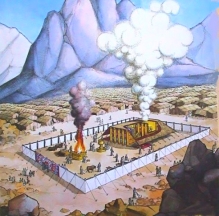WHY SHOULD WE PRAY FOR THE SICK?
 Jesus is our model
Jesus is our model
He told his disciples: “Most assuredly, I say to you, he who believes in me, the works that I do he will do also; and greater works than these he will do, because I go to My Father.” (John 14:12). He also explain that just as the Father had sent him to the world he was sending his disciples out to the world to freely give to others everything that they had freely received from him.
God uses man to release the blessings of reconciliation
- God uses man to preach salvation
- God uses man to teach sanctification
- God uses man to exercise spiritual gifts to edify the church
- God uses man to bring deliverance from demonic oppression
- God uses man to break the curses of poverty and hopelessness
- Many times God uses man to heal the sick
God can do all of these things using his own spiritual power, and in some cases He does. However, most of the time He desires to use human beings to fulfill his work, to bring salvation, spiritual growth, deliverance, help to the poor and hope to the hopeless.
God uses man to release the blessings of healing
In the Old Testament, most of the healings recorded in the Scriptures happened because of the action of a prophet or leader.
- Moses prayed for Miriam’s healing of leprosy. (Numbers 12:13)
- Elisha prayed for the resurrection of the widow’s daughter. (2 Kings 4:18-37)
- Elisha sent Naaman to bathe seven times in the Jordan River for his healing. (2 Kings 5:1-19)
- Isaiah commanded that an ointment be prepared for the healing of Hezekiah. (2 Kings 20:1-11)
In the New Testament, we find numerous instances of healings operated by the Lord through the hands of men. The Gospels are full of cases of healing performed by the Lord, generally by a touch of his hand or some other physical action. As we noted before, the Lord also sent his disciples to preach and heal (Matthew 10; Mark 6; Luke 9, 10). Some healings of Christians happened after the ascension of the Lord:
- Philip healed many in Samaria. (Acts 8:5-7)
- Ananias restored Paul’s sight. (Acts 9:10-18)
- Peter healed the paralytic at the Temple (Acts 3:1-8)
- Peter healed Aeneas in Lydda. (Acts 9:32-35)
- Peter resurrected Dorcas from the dead at Joppa. (Acts 9:36-42)
- Peter resurrected Eutychus from the dead (Acts 20:12)
- Extraordinary miracles were wrought by Paul in Ephesus (Acts 19:11-12)
There are few recorded instances where God healed through his supreme power without using a human agent. Paul wrote that the gifts of the Holy Spirit, including gifts of healing (verse 9), are given to man to edify the church (1 Corinthians 12:1-11).
God offers us these gifts because He expects us to make good use of them! However, if God has released the blessings provided by the death that Jesus suffered on the cross to the children of God as well as to non-Christians, then those who believe in Jesus must involve themselves more and more in the ministry to the sick!
Ministry to the sick is a demonstration of the love of God
God’s heart and desire is to heal. God demonstrated his heart to heal through the life of the Lord Jesus Christ. He revealed his heart as a means of healing in Isaiah 61:1-4, which the Lord refers to in Luke 4:18-21 mentioned previously in the following manner:
The Spirit of the Lord is upon me, because He has anointed me to preach the gospel to the poor; He has sent me to heal the brokenhearted, to proclaim liberty to the captives and recovery of sight to the blind, to set at liberty those who are out oppressed; to proclaim the acceptable year of the Lord” and He began to say to them, “today this scripture is fulfilled in your hearing. (Luke 4:18-19, 21)
Jesus repeatedly indicated that He only did what the Father revealed to Him, and that He only did what He saw the Father doing. Jesus healed all of those who came to him for healing. There were no exceptions! There is no recorded case where a person asked Jesus to heal someone and He refused, even when great multitudes pressed in on Him.
When evening had come, they brought to him many who were demon-possessed. And He cast out the spirits with a word, and healed all who were sick. (Matthew 8:16)
Luke described the same occasion as follows:
When the sun was setting, all those who had any that were sick with various diseases brought them to Him; and He laid his hands on every one of them and healed them. (Luke 4:40)
The heart of God clearly shows that He desires to heal all of those who come to Jesus. The Psalms are full of examples of how the psalmist cried to the Lord and how He responded by delivering them from various difficulties. In Psalm 103, David commented that God “heals all sicknesses”. David must have witnessed healings of all types through divine intervention.
Healing the sick is a demonstration of the power of God
The Father gave authority to Jesus over infirmities, sicknesses and demonic oppression. The fact is that He possessed and still possesses authority over all of the earth. The Scriptures confirm this in various ways. Here are two examples:
He is the image of the invisible God, the firstborn over all creation. For by him all things were created that are in heaven and that are on the earth, visible and invisible, whether thrones or dominions or principalities or powers. All things were created through him and for Him. And He is before all things, and in him all things consist (Colossians 1:15-17)
All authority has been given to Me in heaven and on earth. (Matthew 28:18)
Jesus also was able to transfer his power over sickness and oppression of the devil to his disciples. Lucas said:
Then He called his twelve disciples together and gave them power and authority over all demons, and to cure diseases. So they departed and went through the towns, preaching the gospel and healing everywhere. (Luke 9:1, 6)
In Lydda, Peter ministered healing to Aeneas, who was bedridden and paralyzed for eight years, saying:
And Peter said to him, “Aeneas, Jesus the Christ heals you. Arise and make your bed.” Then He arose immediately. (Acts 9:34)
After Peter and John healed the lame man at the Temple, the high priest asked Peter, “By what power or by what name have you done this?” (Acts 4:7) Peter, full of the Holy Spirit, answered:
If we this day are judged for a good deed done to a helpless man, by what means he has been made well, let it be known to you all, and to all the people of Israel, that by the name of Jesus Christ of Nazareth, whom you crucified, whom God raised from the dead, by him this man stands here before you whole. (Acts 4:9-10)









Recent Comments